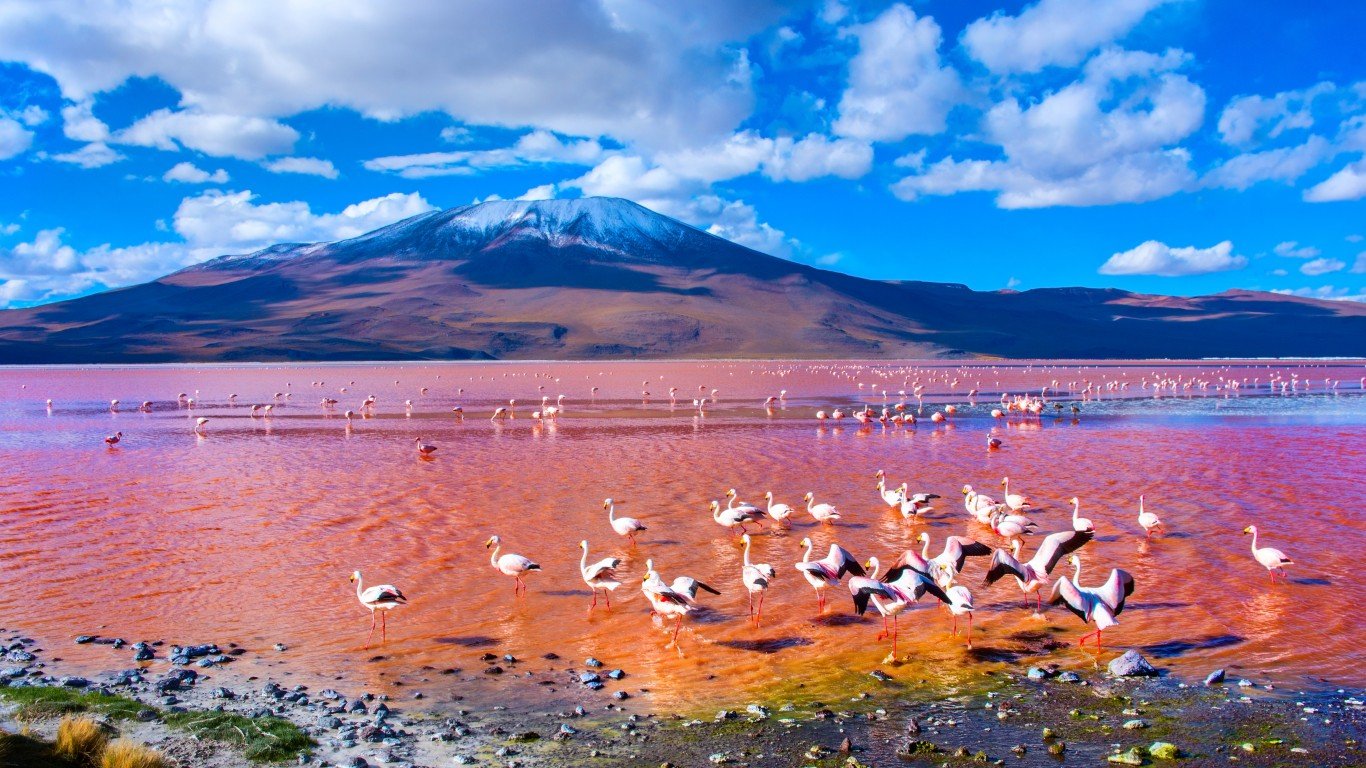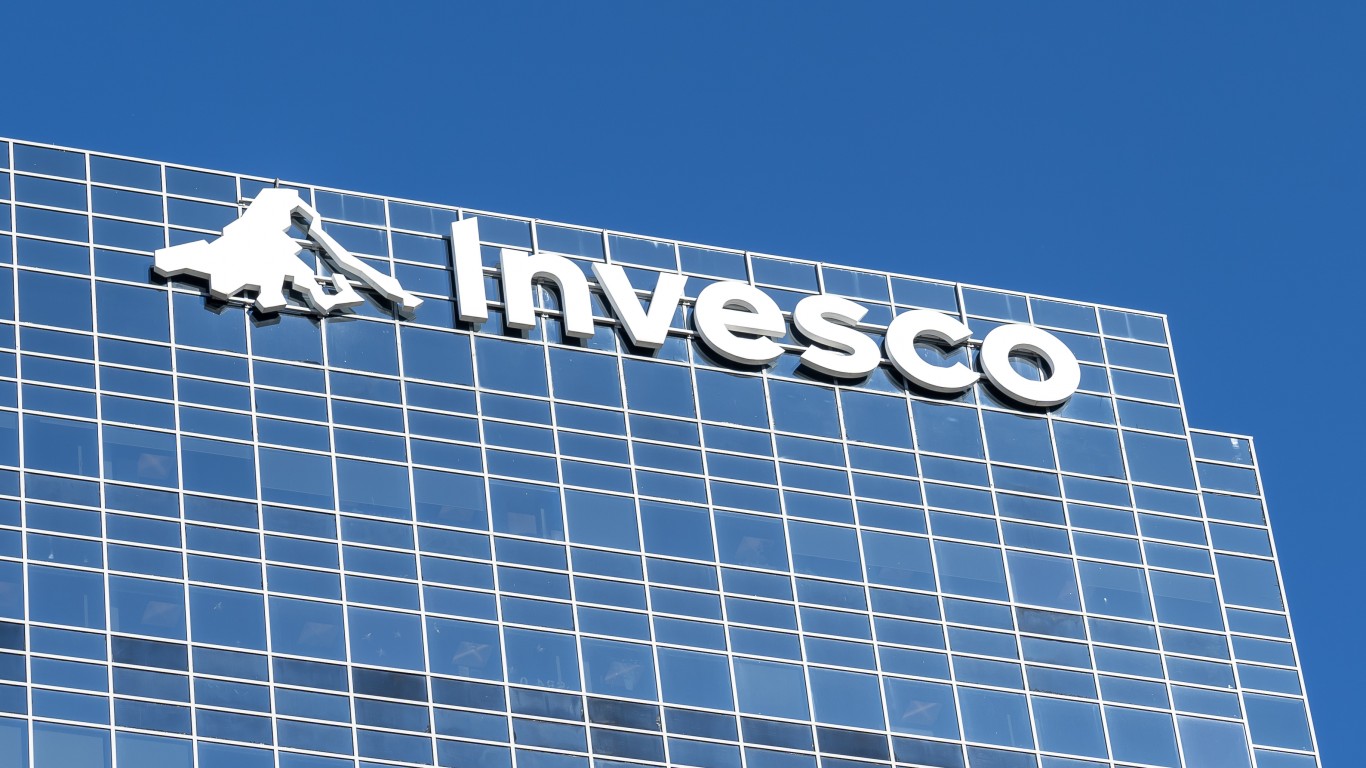

24/7 Wall Street Insights
- Water is essential for life, and as such, water is and has been the most precious commodity on the planet since time immemorial.
- The stocks of companies involved with water infrastructure distribution, desalinization, conservation, and routing for hydropower, agriculture, and other purposes are usually considered to be defensive, as the demand is constant and less prone to market, interest rate, or geopolitical policy fluctuations.
- For investors seeking dividends, click here for a free report on two high dividend stocks.
The Historical Battle Over Water

Although it is considered a mystery film noir, the plot of Roman Polanski’s Chinatown (1974) actually revolves around the post-Depression era California water wars. Los Angeles politicians fought with ranchers and farmers over water rights in the Owen Valley, and Chinatown delves into the power struggle over the graft, extortion, and scandals that control of water would entail.
But battling over water rights is nothing new. The ancient Sumerian states fought a war over tribal water rights in 2400 BC. Historical conflicts have continued throughout the ages in Africa, the Middle East, Asia, Europe, and the Americas even until the present day.
Thankfully, modern industrialized societies have usually been able to settle contemporary disputes without violence. Water conservation issues can still get contentious, as the Colorado River water conflict between California and Arizona as recently as 2023 have demonstrated.
21st Century Water Resource Management and Investment Opportunities – Step 1

While a majority of nations still control water resources, many, such as Spain, France, Australia and India, have public/private partnerships. Other nations, like Bolivia, are mandated to have a percentage of water resources in the private sector to qualify for IMF and IDB loans. The UK is completely privatized and a sizable part of the US is as well. Innovation speed of development and implementation derived from the private sector far exceeds what can usually be attained in the public domain, although high-tech Singapore is the outlier exception. Therefore, the stocks of private sector water management companies are where investment opportunities lie.
Due to logistical realities, both private and public local utilities act with a fairly wide degree of autonomy in the US. States with a large agriculture industry will have different requirements then those who use water for fracking shale oil. Likewise, urban states with concentrated population densities will have varying needs. Additionally, weather trends, rainfall and droughts are all environmental considerations that need to be weighed when analyzing ROI chances. 24/7 Wall Street has covered the topic of water several times in the past, including an article about the different types of water treatment used to make it safe for drinking.
Security Type Selection – Step 2

The US Environmental Protection Agency (EPA) has received over $50 billion under the Bipartisan Infrastructure Law for improving drinking water, wastewater, and stormwater infrastructure. Unsurprisingly, this has led to a growth of attention for US based water infrastructure stocks, and for ETFs and mutual funds to proliferate.
Depending on the results of one’s research, a portfolio can be assembled depending on the level of exposure desired for the water infrastructure sector. This can be predicted on the types of companies, their regional activities, and past history, among other criteria.
On the other hand, water may just be one of several sectors an investor may wish to hold in a portfolio on a generalized basis. Rather than focus on specific companies, there are mutual funds and ETFs that could serve as sector exposure vehicles. They also have the benefits of analysis teams, corporate trading leverage and diversification among a menu of different stocks on a pro rata basis. The right ETF might be holding shares of the stocks that are best calculated to fit with an investor’s needs, so this could be an easy way to get a piece of all of the top selections rolled up into a single security.
If one wishes to combine water infrastructure exposure with international diversification, there are also foreign exchange listed stocks and dedicated international mutual funds that could be obtained.
Creating the Portfolio – Step 3

For investors looking for just one or two water industry stocks to add to a current portfolio, there are plenty of options from which to choose. If those investors are looking to assemble a dedicated water industry portfolio of three or more securities, some combination that offers diversification of geography, history and other factors should be a consideration. Below are a few examples of the different types that analysts have rated highly.
Invesco Water Resources ETF

At $2.1 billion AUM, Invesco Water Resources ETF (NASDAQ: PHO) is the largest US exchange ETF. Its policy is to invest a minimum of 90% of its assets in stocks listed in the NASDAQ OMX US Water Index, comparable US stocks, or ADRs of foreign water industry securities. Most of the companies are involved in water conservation and purification for residences, businesses, and industries.
The top (3) largest holdings in the portfolio as of the end of May 2024 are: Ecolab Inc. (NYSE: ECL): 7.99%; Danaher Corp. (NYSE: DHR): 7.85%; and Roper Technologies (NASDAQ: ROP): 7.57%.
Consolidated Water

Headquartered in the Cayman Islands, Consolidated Water (NASDAQ: CWCO) builds, manages and operates US, Bahamas and Cayman Islands located water production and treatment plants. The company uses reverse osmosis technology to create potable water from seawater. Consolidated Water supplies water to residential, commercial and government end-users through its retail, bulk, services and manufacturing divisions.
In addition to growing over 87% last year with 16% margins, Consolidated Water has long-term desalination contracts in the Cayman Islands, Bahamas, and British Virgin Islands, and the large influx of migrants over the past three years is anticipated to boost US demand as well.
Beijing Enterprises Water Group

Beijing Enterprises Water Group (HK: 0371) is based in Hong Kong and has listings as well in France and Germany. It is the leading Chinese water recycling and ecological protection company, and is the only Asian water company to receive an ESG “A” rating. The company designs, finances, builds, and operates water facilities in China with an additional 37 plants in Singapore, Macao, Malaysia, and Portugal.
Beijing Enterprises Water Group is the top water company in terms of total assets, revenues, and water capacity. It is a main board member of the Stock Exchange of Hong Kong Limited (HK exchange equivalent to a Dow stock), and is a constituent of the Hang Seng China-affiliated Corporations Index and the Morgan Stanley Capital International Index.
Changing demographics and technological advances will hopefully allow water to continue to nurture civilization. Companies such as the ones included here are all contributing to that goal, which is critically important. Much of what is in use now is based on engineering from the early 20th century, and needs to be replaced with modern improvements. The Bipartisan Infrastructure Law was created to address aging infrastructure that is losing millions of gallons of water daily. China’s Three Gorges Dam is already demonstrating deterioration and any breach could lead to a flooding disaster. Support of companies doing the R&D to fix these problems can reap humanitarian, as well as financial benefits.
ALERT: Take This Retirement Quiz Now (Sponsored)
Take the quiz below to get matched with a financial advisor today.
Each advisor has been vetted by SmartAsset and is held to a fiduciary standard to act in your best interests.
Here’s how it works:
1. Answer SmartAsset advisor match quiz
2. Review your pre-screened matches at your leisure. Check out the advisors’ profiles.
3. Speak with advisors at no cost to you. Have an introductory call on the phone or introduction in person and choose whom to work with in the future
Take the retirement quiz right here.
Thank you for reading! Have some feedback for us?
Contact the 24/7 Wall St. editorial team.



